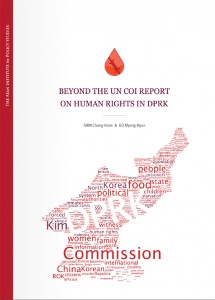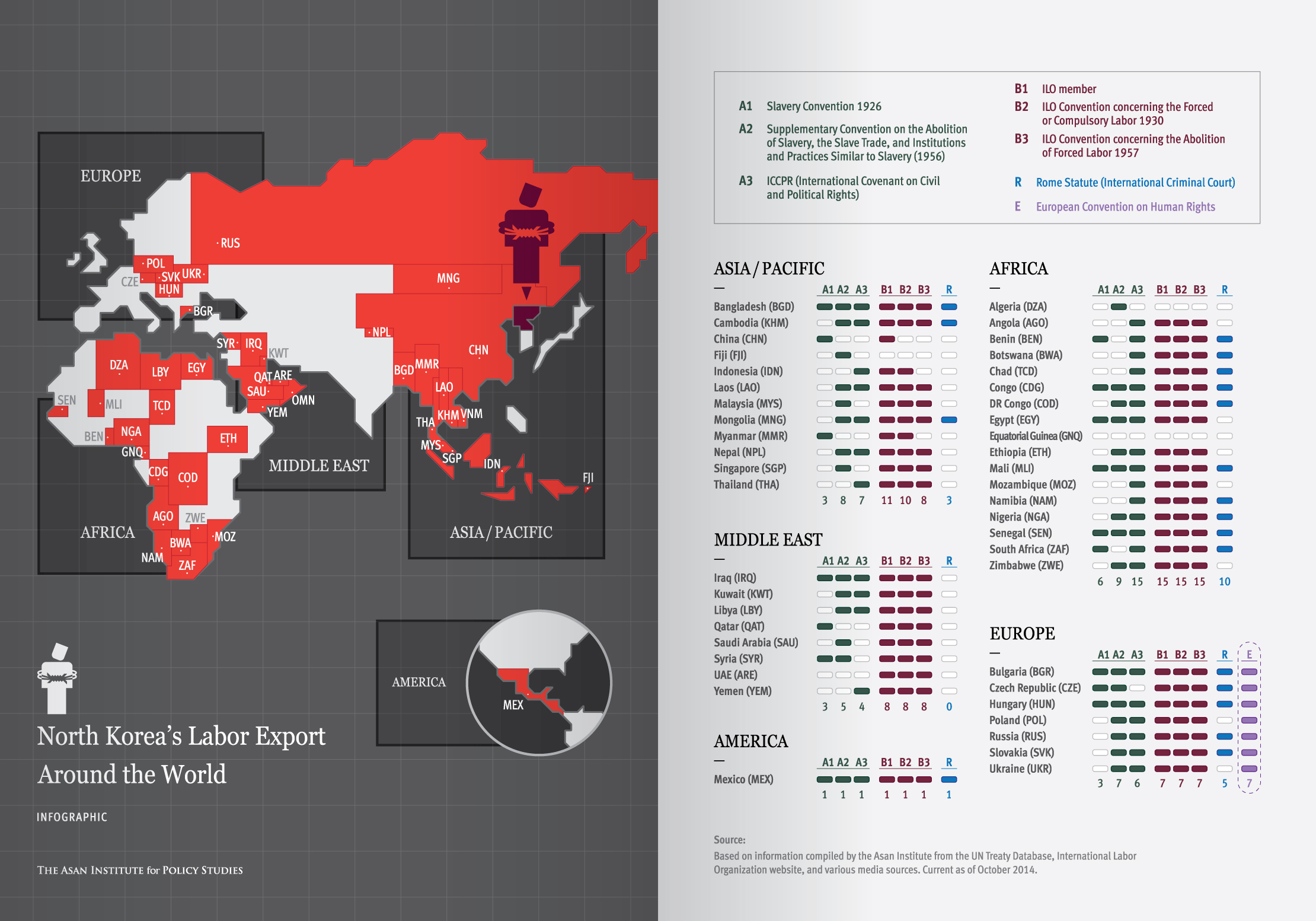Asan Institute-Korea Society Seminar: “Slavery and Forced Labor: Beyond the UN Report on Human Rights in North Korea”
Asan Report by Dr. Shin Chang-Hoon and Dr. Go Myong-Hyun
Executive Summary
On February 17, 2014, the United Nations Commission of Inquiry on Human Rights in the Democratic People’s Republic of Korea released a landmark report. The report findings outline in horrendous detail the crimes against humanity being perpetrated in North Korea. In its investigations, the Commission found that widespread and systematic human rights violations are being committed pursuant to state policy. Further characterizing the DPRK as a totalitarian state that “does not have any parallel in the contemporary world,” the report finds that North Korea’s Supreme Leader, Kim Jong-un, bears direct personal responsibility for the crimes.
Invoking the concept of the Responsibility to Protect (R2P), the report called on the North Korean regime to immediately implement systematic changes to ensure protection of its citizens and their rights. It also recommended that the international community engage with civil society groups working in North Korea to provide information and raise awareness about human rights. The commission suggested referring the case to the International Criminal Court (ICC), as well as enacting targeted sanctions against individuals and entities responsible for committing abuses.
The UN COI Report places special emphasis on the plight of concentration camp inmates, religious believers, forcefully repatriated defectors, and international abductees. The Hon. Michael Kirby, the report’s chair, even asserted that the atrocious treatment of these groups by the regime is tantamount to “political genocide.” Yet, as the Commission’s report also makes clear, these are not the only groups suffering from grave human rights violations in North Korea.
To augment the Commission’s findings, this report by the Asan Institute for Policy Studies, titled Beyond the UN COI Report on Human Rights in DPRK, seeks to further examine the human rights situation of ordinary North Koreans. In particular, it details abuses suffered by North Koreans sent overseas as forced laborers and those working in the country’s nuclear facilities. It concludes that these groups are subjected to slavery and forced labor conditions that violate international law. Institutionalized by the state government, these conditions are further symptomatic of how gross human rights violations are routinized at all levels of North Korean society.
Those working in the country’s nuclear program and as forced laborers overseas play an important role in the North Korean regime’s efforts to bypass existing international sanctions. Addressing the treatment of these two groups thus offers an opportunity to incorporate human rights issues into the existing sanctions regime. Based on interviews with North Korean defectors with direct experience in the two fields, this report identifies numerous state practices that constitute modern slavery in clear violation of human rights law.
With regard to North Korea’s use of forced laborers overseas, it finds:
- North Korea’s labor export is organized, managed, and overseen as a matter of state policy.
- Individuals are subject to constant surveillance by North Korea security agents, who are embedded with the workers, limiting any freedom of movement.
- The average wage is between 120-150 dollars a month, as stipulated by North Korean state regulations. Workers are not paid directly by their foreign employers, who pay much higher amounts to the North Korean state.
- Workers are not allowed to return to North Korea until their contract expires, which usually lasts three years.
- Work hours range between 12 and 16 hours a day, sometimes as much as 20 hours, and laborers are only provided one or two rest days a month.
- Earnings are not sent back as remittances, but appropriated by the state and transferred back to the country in the form of bulk cash, in clear violation of UN sanctions.
With regard to working conditions in North Korea’s nuclear facilities, it finds:
- Widespread use of conscript labor in the construction of facilities
- Inadequate health and safety measures for workers
- No provision of information on occupational safety standards
It is clear that, unless the international community applies more pressure, North Korea will continue these inhumane policies. The report thus offers several policy recommendations that can contribute to improving the human rights situation in North Korea.
1. The United States should adopt more comprehensive sanctions against North Korea modeled on the 2012 Iran Threat Reduction and Syria Human Rights Act.. Targeted sanctions against North Korea should include the aspects of human rights violations. Speedy adoption of the 2014 North Korea Sanctions Enforcement Act (HR 1771) will be an important step towards that end.
2. The international community should pressure countries that make use of North Korean labor to enforce basic labor protection standards. As of 2013, 16 countries made use of North Korean forced laborers. These countries should ensure North Korean workers are treated fairly on par with their domestic workers, stop the practice of giving worker’s salaries to the North Korean government, and conduct regular inspections at work sites and housing facilities to ensure basic standards are being met. International sanctions should be applied against individuals and entities that abet the human right abuses of North Korean laborers.
3. The international community should ban the trade of goods, items, or technology with North Korea that can be used to commit human rights abuses. The international community should pay particular attention to restrictions on the flow of surveillance technology and police equipment, which could be misused by the repressive North Korean regime.
4. North Korea should abide by its international treaty obligations and immediately abolish any slavery or forced labor practice as prohibited by the International Covenant on Civil and Political Rights (ICCPR) that it acceded to on September 14, 1981, and join the International Labor Organization and accede to other international anti-slavery treaties.
5. South Korea should fully support the UN human rights field office to be set up in Seoul and closely work with the UN Special Rapporteur on the human rights situation in North Korea. It should also strictly enforce the relevant law that regulates the direct payment of wages to North Korean workers at the Kaesong Industrial Complex.
* The report’s release has been covered in the Korean press by the following news agencies: Newsis, Kookmin Ilbo, Asia Economic Daily.

 Facebook
Facebook Twitter
Twitter
![[Asan Report] North Korea's Crimes Against Humanity](http://en.asaninst.org/wp-content/uploads/2014/11/Asan-Report-North-Koreas-Crimes-Against-Humanity-729x1024.png)


